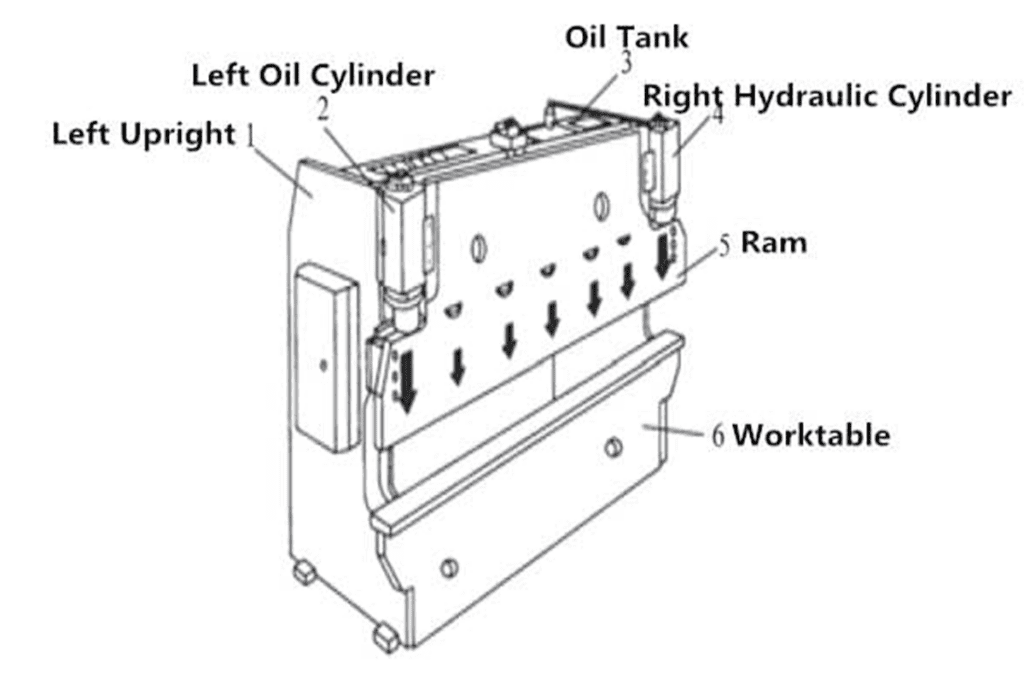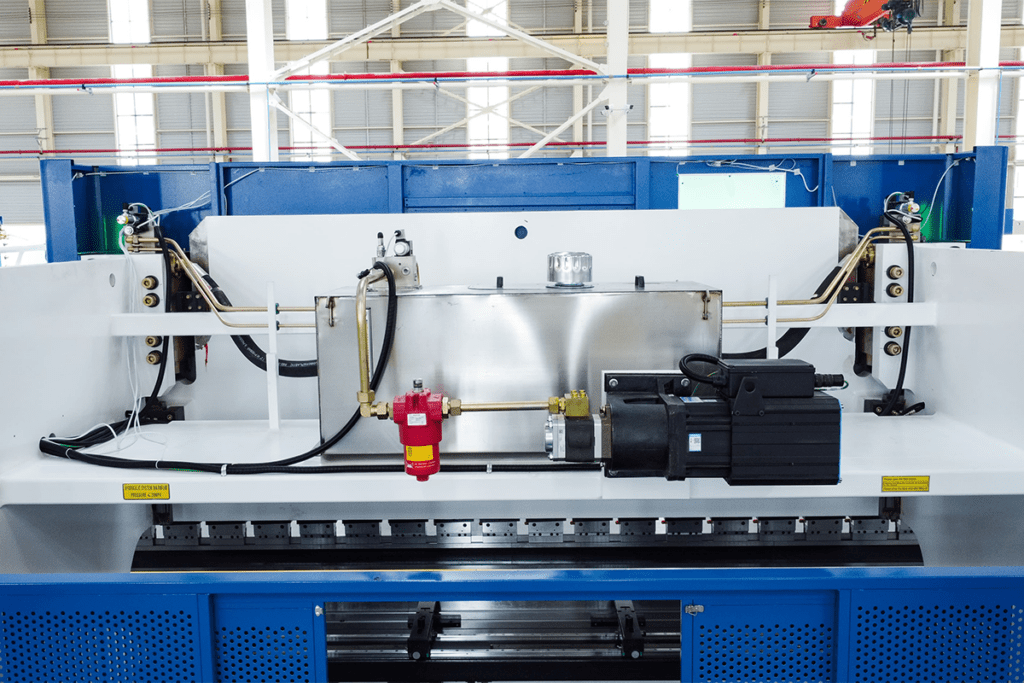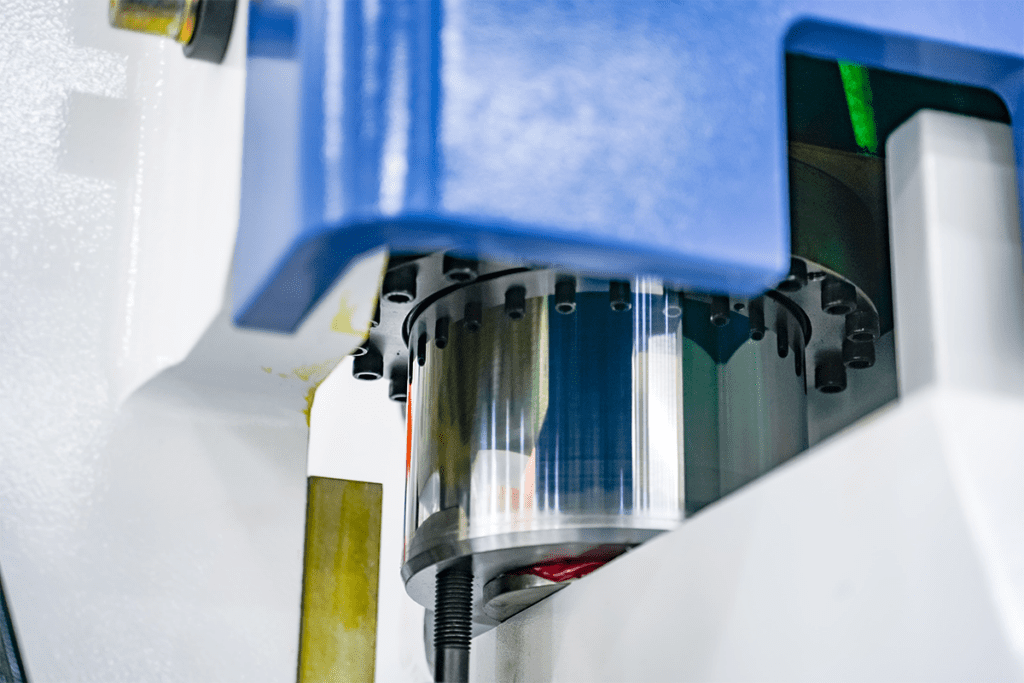I. Introduction
Hydraulic oil refers to the amount of hydraulic oil required by the hydraulic system of an operational machine.
A hydraulic system is responsible for offering power and control for various components.
The amount of hydraulic oil required by the machine is determined by various factors, such as the size of the machine, types of hydraulic system, and operational conditions.
Generally speaking, the large machine with a more complex hydraulic system will need much more volume of hydraulic oil.
Hydraulic oil is unignorable for press brake. As a working medium for the driven system, its quality directly affects the operation efficiency and use lifespan.
The main function of hydraulic oil is to pass through the pressure to various movement parts, achieving translation of the guide rail and end plate and applying bending moment.
It uses a closed-loop system composed of an oil cylinder and pump to control the bending depth and angle precisely.
Besides, hydraulic oil can slow down the impact, and reduce the wear between various parts of the machine.
Only by choosing high-quality hydraulic oil suitable for press brake specifications can it perform transition and damping functions.
Low-quality hydraulic oil is easy to cause oxidation and corroding, affecting the lifespan of the machine’s parts.
II. The Role of Hydraulic Oil in Press Brakes
Hydraulic oil plays an essential role in CNC press brakes.
The hydraulic system is the core of the CNC press brake.
It transforms the power via hydraulic oil, thus driving the various parts of the machine.
The main function of hydraulic oil is to pass through the power, lubricate, and seal.
The viscosity of hydraulic oil has a great influence on a machine’s properties and lifespan.
CNC press brake usually requires hydraulic oil with viscosity from 4°E to 5°E.
Besides, the hydraulic oil’s temperature greatly affects the performance of the machine.
If the temperature of the hydraulic oil is over high or over low, it will affect the performance of the machine.
Thus, keeping the temperature of hydraulic oil in proper range is very important.

III. Types of Hydraulic Oils and Selection
The press brake hydraulic oil can be divided into the following types according to different circumstances and requirements:
HL: Low-viscosity Hydraulic Fluid
The viscosity index is 32-46. HL features rust resistance and oxidation resistance. This type of hydraulic oil is usually used under low temperatures because its viscosity is low, which is beneficial to keep the fluid of the hydraulic system working efficiently. It can be used in hydraulic oil cylinders, machine tools, or excavators. HL can be replaced by HM-type hydraulic oil.
HM: Medium Viscosity Hydraulic Fluid
The viscosity index is 46-50. It is the most common type of hydraulic oil. Compared with the HL type, it improves abrasiveness and features medium viscosity, suitable for low, medium, and high hydraulic systems, and also can be applied to smooth parts of medium load machinery.
HR: High Viscosity Hydraulic Fluid
The viscosity index is 50-65. Compared with the HL type, this HR improves its viscosity temperature. It is usually used in poor working conditions, such as high temperature, high pressure, and great changing circumstance temperature. It can bear much pressure and temperature because of its higher viscosity, such as field factories, and ocean-going ships, which can be replaced by HV-type hydraulic oil.
HV: High Viscosity Index Hydraulic Fluid
The viscosity index is larger than 65. This type of hydraulic oil has a higher viscosity index, which can keep a steady viscosity under circumstances of different temperatures, and is suitable for heavy-duty or extremely high-temperature working temperatures.
HG: Anti-Wear Hydraulic Fluid
This type of hydraulic oil is added anti-wear agent, which features anti-slide, and anti-stick, which can reduce the wear of the hydraulic system, which is applicable for systems possessed of hydraulic transition and slide surface. This type offers good performance, but the cost is high.
HS: High-Performance Hydraulic Fluid
HS-type hydraulic oil has low viscosity, and strong thermal stability, suitable for strict working conditions, such as high-temperature, high-pressure, or high-speed applications.
Then there are the factors to take into consideration when choosing hydraulic oil:
Location
The climate and environmental conditions in different locations are different. The hydraulic oil is suitable for the local environment should be chosen.
Season
Temperature and humidity in different seasons are varied. Seasonal hydraulic oil should be chosen.
Machine Type
Different types of press brakes require different types of hydraulic oil. Proper hydraulic oil should be chosen based on the machine’s type.
Working Temperature Range
If the working temperature is relatively low, HL-type hydraulic oil should be chosen. While the temperature is high, it may require high-temperature hydraulic oil.
Pressure Requirements
Take the biggest working pressure required by the hydraulic system into consideration. If the hydraulic system needs to bear high pressure, the high-pressure hydraulic oil should be chosen.
Viscosity Level
Choosing the viscosity level according to the viscosity required by the hydraulic system. The common viscosity level includes HM, HR, and HV. Generally, the hydraulic manufacturer will offer a suggested viscosity level.
Anti Abrasive Property
If the hydraulic system needs extra anti-wear protection, the HG-type of hydraulic oil, which is an added anti-wear agent can be chosen.
Biodegradability
If the environmental requirements are high, hydraulic oil with biodegradability can be used to reduce environmental pollution.
Manufacture Suggestions
It is better to choose hydraulic oil based on the press brake manufacturer’s suggestions because they often provide the most suitable hydraulic oil type and specification.
Hydraulic Oil Quality
Ensure the hydraulic oil purchased fits the international and industry standards, to ensure the quality and performance.
Maintenance Requirements
The lifespan and changing cycle of the hydraulic oil should be considered to ensure the reliability and stability of the system.
IV. Causes of Hydraulic Oil High Temperature
Poor Heat Dissipation Caused by Dirt Accumulation
If the radiator or cooler of the hydraulic system is covered with dirt and debris, it will greatly affect the heat dissipation effect.
Just like our skin needs to breathe, the dirt on the radiator surface blocks the "pores" of the system, making the heat not transferred to the air effectively. Thus, the hydraulic oil’s temperature will rise.
Improper Choice of Hydraulic Oil Model
Different types of hydraulic oil have different working temperature ranges and viscosity properties.
If the improper current working temperature or hydraulic oil required by mechanics is chosen, the oil’s heat stability may be insufficient, and the heat produced by system operation may not be born, resulting in an oil temperature abnormal rise.
Improper Adjustment of Pressure
If the pressure in the hydraulic system is set over high, it will cause various components in the system to bear the pressure over the design standard.
This not only increases the power consumption but also makes the oil temperature increase due to the over-large pressure.
At the same time, improper setting of the pressure will accelerate the mechanics wearing, indirectly resulting in the rise of the oil temperature.
Insufficient Supply of Oil Provided by Oil Pump
The oil supply of the hydraulic pump is insufficient, this is also called the “hungry phenomenonâ€, making the pump interior generate cavitation. This will not only cause vibration and noises in the hydraulic system but also add friction heat inside the system, thus the oil temperature will rise.
Interior Leaking Problems
If the interior of the hydraulic system exists leaking, the oil will form a vortex in low pressure area.
This unnecessary power transmission will be transformed into thermal energy, causing the oil temperature to rise.
The leaking is not only the reason for the rise of hydraulic oil but also the potential risk of decreasing system efficiency.
Hydraulic Components Wear
Due to long-term running, the various components interior the hydraulic equipment will gradually generate wear.
This abrasiveness will cause the expansion of intervals in hydraulic components, resulting in more interior friction when the oil flows.
Thus, more heat will be generated. The abrasive components will probably cause leaking.
V. Maintenance and Care

Regular Cleaning
Press brake surface, die and working area should be kept clean.
This not only includes mechanical cleaning but also covers the hydraulic system and electrical system cleaning.
Regular cleaning of the oil, metal debris, and dirt can decrease the wearing, and avoid the happening of accidents.
Checking and Maintaining the Oil Level
The fundamental measurements of preventing hydraulic system malfunction include checking the hydraulic oil level regularly and making sure the level is within the normal range.
If the oil level is too low, it will cause the hydraulic system to intake the air, thus affecting the system's function.
If the oil level is too high, it will cause an oil leak.
Checking Oil Quality
Checking the quality of the hydraulic oil to ensure the oil still works.
This could be achieved by oil analysis, which will check the contaminants, water content, and viscosity.
Replacing Oil Regularly
Hydraulic oil is the “bloodâ€Â of the hydraulic system, which should be replaced according to the manufacturer’s suggested time or using hours amount strictly.
Replacing the the oil in time can make sure the hydraulic system is clean, no pollution, and friction decreases.
Checking and Replacing Filter
Checking and replacing the filter regularly ensures the unblocking and effective working of the filter.
Filter blocking will cause pressure to decrease and property to decrease.
Adjusting the System Pressure
Adjusting the system pressure according to the operational manual and professional guidance to fit the working requirement.
Avoid working under the over high pressure for a long time, thus reducing the system loading and consumption.
Lubricate and Plan
Good lubrication is important for decreasing friction and avoiding rust.
Follow the manufacturing’s lubrication plan to lubricate regularly.
This can significantly improve the working efficiency and use lifespan.
Weekly Maintenance Plan
Set and obey the weekly maintenance plan, including the daily, every week, every month, once two months, once three months as well as 2000 hours of maintenance.
Daily maintenance may contain checking the oil level, and equipment cleaning.
A longer maintenance cycle includes replacing the oil, deep-checking the hydraulic system, and verifying the electrical system.
Maintenance at each cycle is the key to maintaining the long-term stable operation of the equipment.
What’s more, with regular training the operators can improve their maintenance awareness and skills so that each press brake's healthy state can be taken care of nicely.

VI. Conclusion
Hydraulic oil is regarded as an essential working transmission medium, its quality directly affects the machine's working efficiency and use lifespan.
In this passage, we delve into the discussion about the importance of hydraulic oil for press brake properties, and how to ensure the best working state of the equipment via proper maintenance procedures.
If you want to purchase a press brake and want to know the detailed price, you can contact us, and our salesman will give you a quotation.
Air hoses are typically made of durable materials such as rubber, PVC, or polyurethane, which can withstand high-pressure air and resist abrasion, weathering, and chemicals. They come in various lengths, diameters, and colors to suit different needs and preferences.
Air Hose,Turbo Hose,Rubber Intercooler Hose,Fiat Turbo Intercooler Hose
HE BEI HONGAN AUTOMOBILE AND MOTORCYCLE FITTINGS CO.,LTD , https://www.honganproduct.com